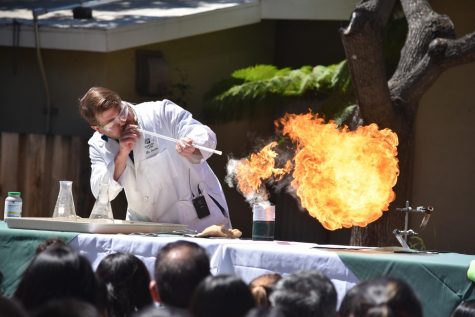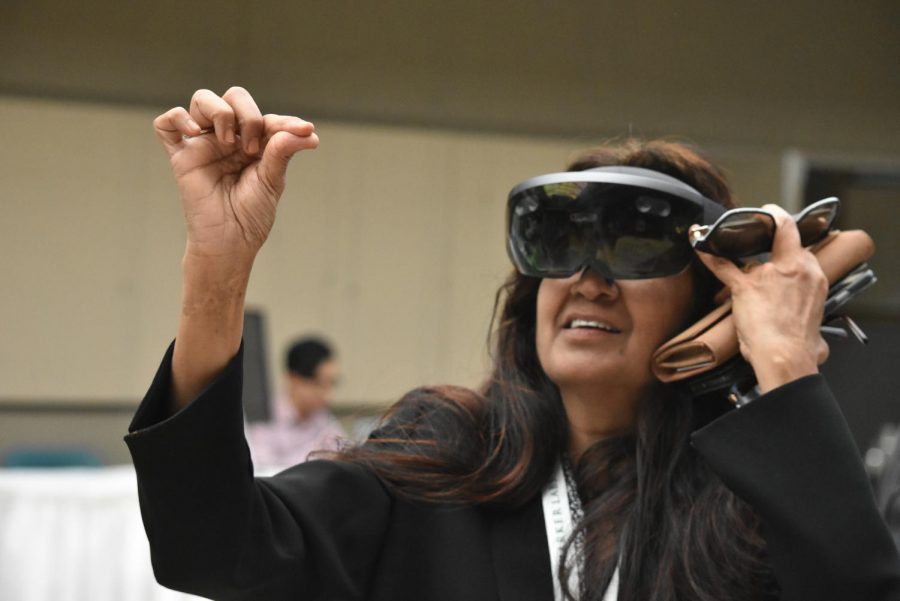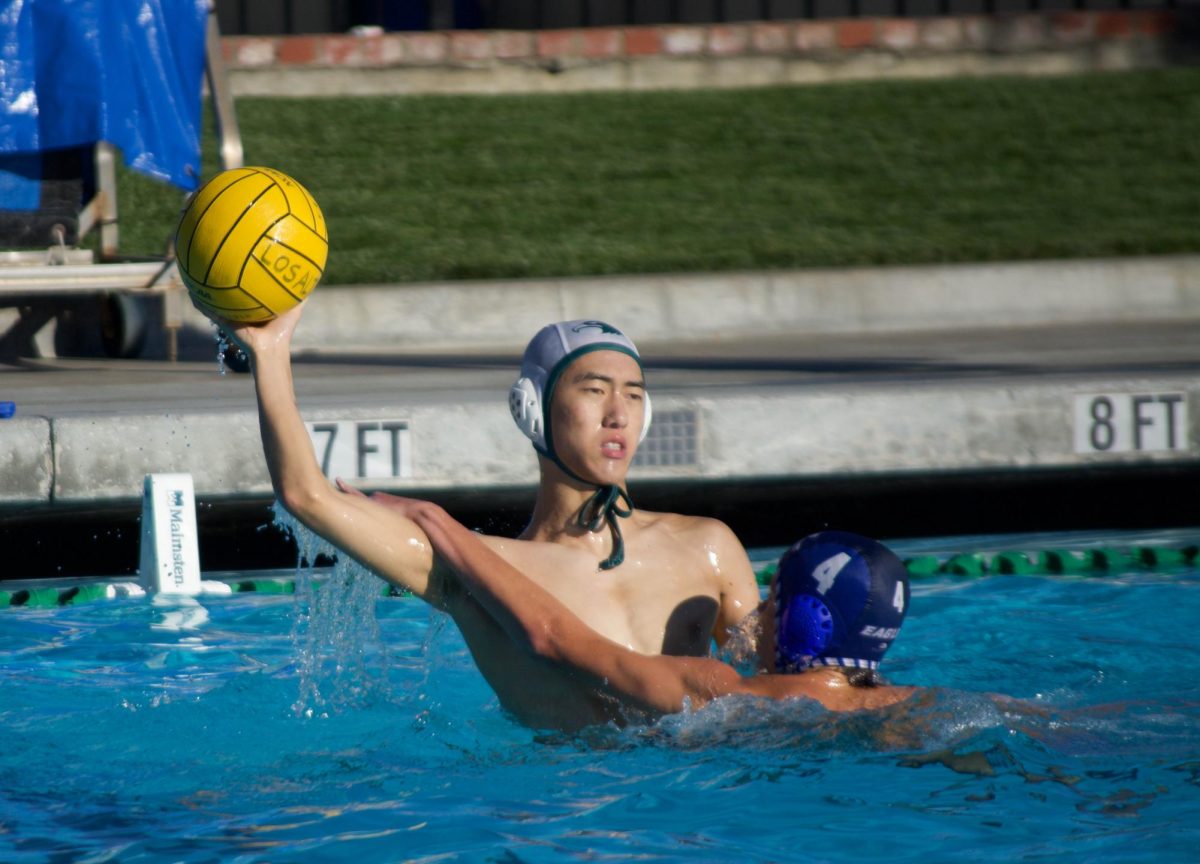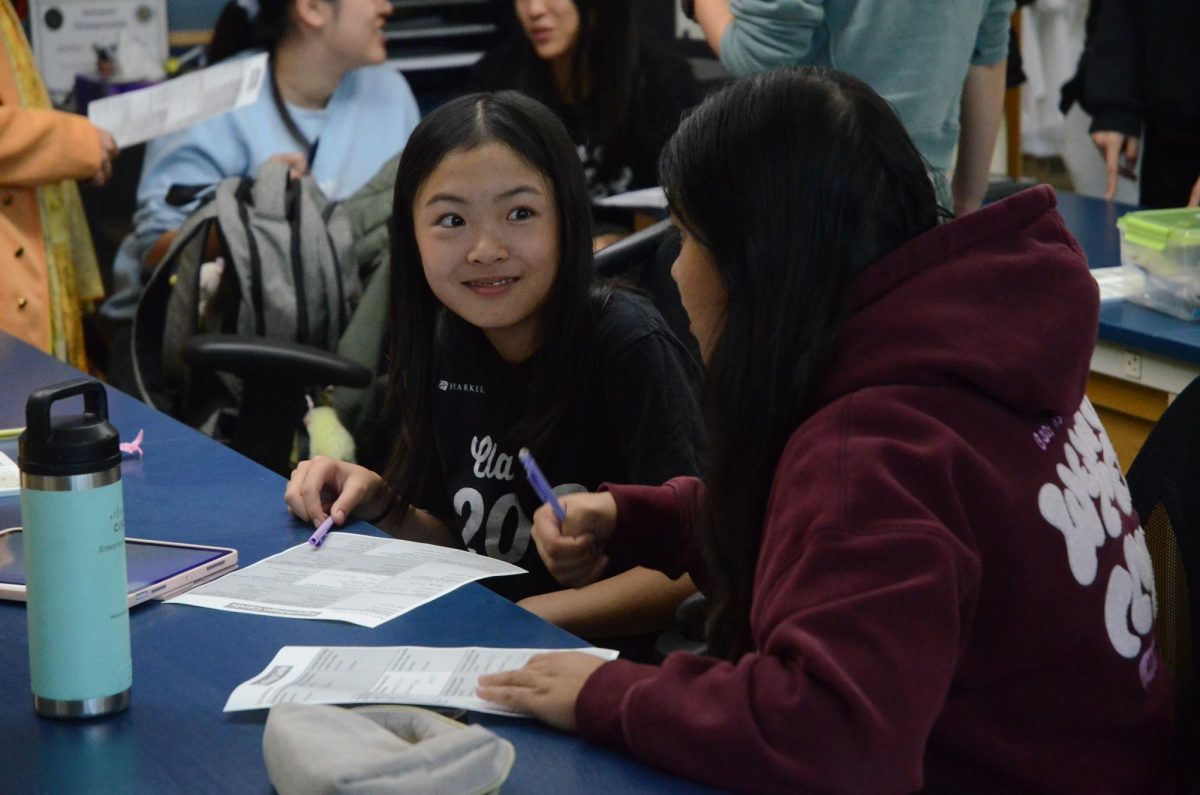AI-themed research symposium draws crowds
A parent tests a virtual reality headset in the Nichols atrium.
May 14, 2018
The Women in Science, Technology, Engineering and Math club (WiSTEM), along with parent outreach volunteers, Harker staff and other clubs including Research Club, held the 13th annual Research Symposium, themed after artificial intelligence, across campus on April 14.
Over 900 people attended the conference, which featured student, faculty and corporate presenters, as well as keynote speakers with experience in the computer science industry, in order to reflect the proceedings of a professional science conference.
Last year’s Symposium was also centered on computer science, but this year’s event focused on the “AI revolution”: how AI can influence daily life.
“The purpose of Symposium is to showcase the research that our students have done in a noncompetitive setting,” upper school science department head and WiSTEM club adviser Anita Chetty said. “If we were to just pick whatever theme we felt like picking, I don’t think we would be doing justice to [Silicon] Valley. Last year, we did predictive analytics and data science, but this year, we really said, ‘No, artificial intelligence is where it’s at.’”
In the morning keynote, Dr. Jeff Dean, who leads the Brain Team at Google, discussed his experience working with machine learning. In the afternoon keynote, Dr. Andrew Beck, CEO of artificial intelligence development company PathAI, addressed how artificial intelligence can improve cancer diagnosis.
“This year’s topic of artificial intelligence is really up-to-date with what students are interested in, and it’s also just relevant to society as a whole right now,” WiSTEM publicity officer Shania Wang (11) said. “I think that Symposium’s really great because it shows you what other students are doing and what your classmates might be involved in outside of the academic sphere.”
The Symposium also included two panel discussions. In the morning, students and industry professionals spoke on diversity in the STEM workforce. In the afternoon, students, teachers and a parent involved in research discussed science opportunities at the upper school. Ramya Rangan (‘12), who participated in the first panel, also gave an address on the function of macromolecules like proteins.
Students could also participate in smaller pre-registered workshops to improve their skills. A workshop hosted by Somnath Banerjee focused on neural style transfer, a specific technique applicable to artificial neural networks, while middle and lower school students benefited from AI workshops held throughout the day. Upper school chemistry teachers Dr. David Casso and Andrew Irvine performed chemical demos in a magic show during lunch.

Chemistry teacher Andrew Irvine demonstrates during his chemistry magic show.
Throughout the day, middle and upper school students presented posters about their research in the auxiliary gym. Companies such as Nvidia and Google displayed products in Nichols Atrium, and student-led booths including Green Team, robotics, Horizon and the aquarium presented to visitors. Also in Nichols Hall, upper school students gave formal talks, and WiSTEM members dressed in white lab coats held activities for younger students throughout the day.
“I have all the WiSTEM girls wear a lab coat because [for] people of my generation, when we thought about a scientist and imagined them in a white lab coat, it was always a man. Commercials on TV, it was always a man,” Chetty said. “Women are scientists, and women can wear a white lab coat, and women can put together an event this massive.”
Next year’s Symposium will be themed “Our Survival: Saving the Planet and Healing Ourselves”, with Dr. Max Holmes and Dr. David Haussler — the deputy director of a leading climate change research institute and the leader of the Human Genome Project — giving the two keynote speeches.
This piece was originally published in the pages of the Winged Post on May 7, 2018.


















![“[Building nerf blasters] became this outlet of creativity for me that hasn't been matched by anything else. The process [of] making a build complete to your desire is such a painstakingly difficult process, but I've had to learn from [the skills needed from] soldering to proper painting. There's so many different options for everything, if you think about it, it exists. The best part is [that] if it doesn't exist, you can build it yourself," Ishaan Parate said.](https://harkeraquila.com/wp-content/uploads/2022/08/DSC_8149-900x604.jpg)




![“When I came into high school, I was ready to be a follower. But DECA was a game changer for me. It helped me overcome my fear of public speaking, and it's played such a major role in who I've become today. To be able to successfully lead a chapter of 150 students, an officer team and be one of the upperclassmen I once really admired is something I'm [really] proud of,” Anvitha Tummala ('21) said.](https://harkeraquila.com/wp-content/uploads/2021/07/Screen-Shot-2021-07-25-at-9.50.05-AM-900x594.png)







![“I think getting up in the morning and having a sense of purpose [is exciting]. I think without a certain amount of drive, life is kind of obsolete and mundane, and I think having that every single day is what makes each day unique and kind of makes life exciting,” Neymika Jain (12) said.](https://harkeraquila.com/wp-content/uploads/2017/06/Screen-Shot-2017-06-03-at-4.54.16-PM.png)








![“My slogan is ‘slow feet, don’t eat, and I’m hungry.’ You need to run fast to get where you are–you aren't going to get those championships if you aren't fast,” Angel Cervantes (12) said. “I want to do well in school on my tests and in track and win championships for my team. I live by that, [and] I can do that anywhere: in the classroom or on the field.”](https://harkeraquila.com/wp-content/uploads/2018/06/DSC5146-900x601.jpg)
![“[Volleyball has] taught me how to fall correctly, and another thing it taught is that you don’t have to be the best at something to be good at it. If you just hit the ball in a smart way, then it still scores points and you’re good at it. You could be a background player and still make a much bigger impact on the team than you would think,” Anya Gert (’20) said.](https://harkeraquila.com/wp-content/uploads/2020/06/AnnaGert_JinTuan_HoHPhotoEdited-600x900.jpeg)

![“I'm not nearly there yet, but [my confidence has] definitely been getting better since I was pretty shy and timid coming into Harker my freshman year. I know that there's a lot of people that are really confident in what they do, and I really admire them. Everyone's so driven and that has really pushed me to kind of try to find my own place in high school and be more confident,” Alyssa Huang (’20) said.](https://harkeraquila.com/wp-content/uploads/2020/06/AlyssaHuang_EmilyChen_HoHPhoto-900x749.jpeg)










